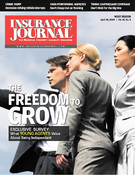As America’s economy slogs through this once-in-a-generation recession, stressed-out consumers are literally being driven to desperation. Growing numbers of drivers around the U.S. are illegally dumping their vehicles for insurance money. Blackened hulks are turning up in remote deserts outside of Las Vegas, for instance.
People’s motives for so-called vehicle give-ups are diverse. Pure greed often plays a leading role. Many drivers also can’t afford their vehicles, especially drivers who bought pricey vehicles on easy credit, beyond their financial means. Other consumers are grasping for insurance cash as their overall financial misery increases, the Coalition Against Insurance Fraud said.
Most of these drivers aren’t hardened criminals. They’re average, normally honest people pushed off a financial and moral cliff. They’re looking for any lifeline they can find.
As the vehicle-fraud trend gains steam, it reveals much about people’s desperation to escape the economic vise as their finances crumble. This crime trend also shows how easily many people will bilk their insurers whenever financial pressure reaches critical mass. The trend appears to be surging around the United States, often in locales where layoffs, foreclosures and other metrics of misery have invaded.
The Coalition investigated locales around the United States early last fall. Warning signs were spreading. Investigators are clamping down on cons, often with aggressive auto fraud task forces that were in place well before the recession increased their caseload.
Some fraud indicators: No damage to the ignition or steering lock; leased vehicle has exceeded its allotted mileage; vehicle was recovered before the time the insured reported it stolen; the vehicle is too expensive for the suspect’s income; and the suspect is behind on lease or loan payments.
With America’s moral compass wobbling, fraud fighters must change the lenient consumer attitudes that make insurance schemes so widespread. It’s impossible to simply arrest this crime out of existence. In fact, sentences for vehicle give-ups often are light, CAIF said.
A spike in public-outreach efforts thus must accompany this spike in auto insurance crimes. Get-tough deterrent messages make people think twice about committing what many consumers think is a harmless prank against insurer.
Topics Trends USA Auto Fraud Personal Auto
Was this article valuable?
Here are more articles you may enjoy.


 BMW Recalls Hundreds of Thousands of Cars Over Fire Risk
BMW Recalls Hundreds of Thousands of Cars Over Fire Risk  What Analysts Are Saying About the 2026 P/C Insurance Market
What Analysts Are Saying About the 2026 P/C Insurance Market  US Appeals Court Rejects Challenge to Trump’s Efforts to Ban DEI
US Appeals Court Rejects Challenge to Trump’s Efforts to Ban DEI  Allstate CEO Wilson Takes on Affordability Issue During Earnings Call
Allstate CEO Wilson Takes on Affordability Issue During Earnings Call 


